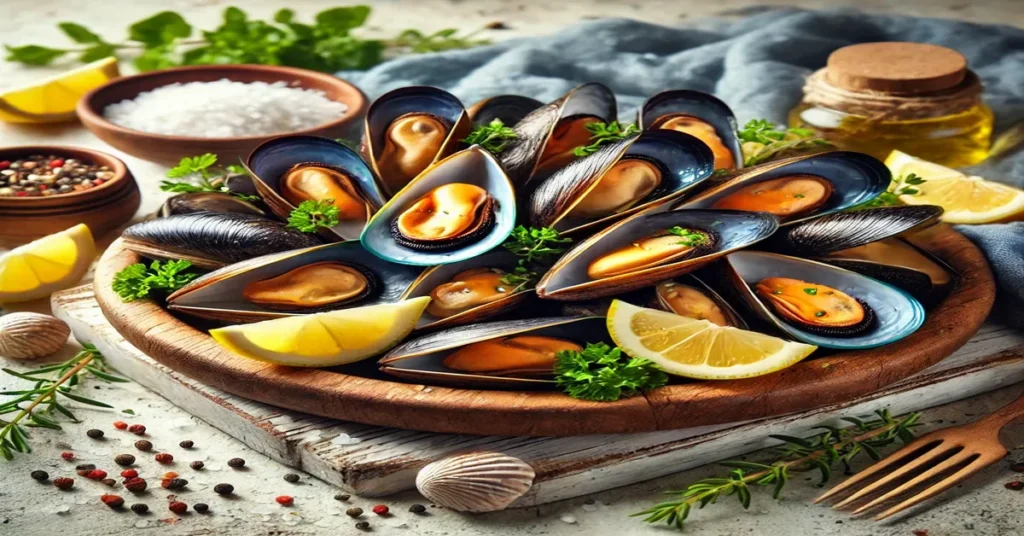Mejillones, or mussels, are a type of bivalve mollusk found in saltwater and freshwater environments around the world. Known for their unique taste, nutritional richness, and versatility in the kitchen, mussels have been enjoyed by coastal communities for thousands of years. From steaming to grilling, mejillones can be prepared in numerous ways and are prized for their health benefits, particularly their high protein content, essential minerals, and omega-3 fatty acids.
In this comprehensive guide, we’ll explore the origins, types, nutritional benefits, culinary uses, and environmental impact of mejillones, along with tips for cooking and enjoying them. By the end, you’ll have a deep understanding of why mussels are a valuable addition to a healthy diet and how to make the most of them in your culinary adventures.
Origins and History of Mejillones
Mussels have a long history of human consumption, dating back over 20,000 years. Archaeological evidence shows that ancient civilizations in coastal regions harvested and consumed mejillones as a source of protein and essential nutrients. Coastal tribes in the Mediterranean, Asia, and the Americas were some of the earliest consumers of mussels, often gathering them from shallow waters or cultivating them on shorelines.
The Romans were among the first to farm mussels, setting up “bouchots” (wooden stakes placed in shallow waters) to encourage mussel colonies to grow. Mussel farming techniques evolved over time, and today, it is a well-established practice that allows for sustainable and efficient production of mejillones.
Mussels are now cultivated around the world, with Spain, France, the Netherlands, and New Zealand among the largest producers. Mejillones have become a culinary staple in many cultures and are celebrated for their rich flavor and nutritional benefits.
Types of Mejillones
There are several types of mussels, each with unique characteristics, though the blue mussel and the Mediterranean mussel are the most commonly consumed. Here’s a look at some popular types of mejillones:
- Blue Mussel (Mytilus edulis): The most common type, blue mussels are small to medium-sized and are known for their mildly sweet flavor and tender texture. They are widely cultivated in Europe and North America.
- Mediterranean Mussel (Mytilus galloprovincialis): Found primarily in the Mediterranean Sea, this type is slightly larger than the blue mussel and has a more robust flavor. Mediterranean mussels are commonly used in European cuisines.
- Green-Lipped Mussel (Perna canaliculus): Native to New Zealand, green-lipped mussels are large, with a distinctive green edge on their shells. They are valued for their unique flavor and high nutrient content, especially their anti-inflammatory properties.
- California Mussel (Mytilus californianus): Found along the Pacific Coast of North America, these mussels are larger and have a stronger flavor, often used in regional seafood dishes.
- Horse Mussel (Modiolus modiolus): Larger and tougher than other mussel varieties, horse mussels are less commonly eaten but are used in some traditional dishes in colder waters, like those around Scandinavia and Canada.
Each type of mejillón has its own flavor profile, size, and culinary applications, allowing for a diverse range of uses in cooking.
Nutritional Profile of Mejillones
Mejillones are a nutrient-dense food, meaning they provide a wealth of essential nutrients while being low in calories. They are an excellent source of protein, omega-3 fatty acids, and a variety of vitamins and minerals. Here’s a detailed look at the nutritional composition of mejillones (per 100 grams):
- Protein: Mejillones are an excellent source of protein, providing around 24 grams per 100 grams. This makes them a great option for muscle maintenance and repair.
- Omega-3 Fatty Acids: Mussels contain significant amounts of omega-3 fatty acids, which are beneficial for heart health, brain function, and inflammation reduction.
- Vitamins: Mejillones are rich in vitamins B12, B2 (riboflavin), and vitamin C, which play a role in energy production, immune function, and red blood cell formation.
- Minerals: They are high in essential minerals, including iron, selenium, manganese, and phosphorus. Iron supports oxygen transport in the blood, while selenium is crucial for immune health and thyroid function.
- Low in Fat and Carbohydrates: Mussels are naturally low in fat and carbohydrates, making them an ideal choice for low-calorie diets.
- Antioxidants: Mejillones contain antioxidants, particularly selenium, which helps combat oxidative stress in the body.
This nutrient-dense profile makes mejillones a powerhouse of essential vitamins, minerals, and healthy fats, supporting overall wellness.
Health Benefits of Mejillones
Mejillones offer numerous health benefits due to their rich nutritional profile. Here’s a look at some of the key health advantages of including mejillones in your diet:
1. Supports Heart Health
The omega-3 fatty acids found in mejillones help reduce the risk of cardiovascular diseases by lowering blood pressure, reducing inflammation, and decreasing cholesterol levels. Omega-3s also help prevent plaque buildup in arteries, which can lead to heart attacks and strokes.
2. Boosts Immune Function
Mejillones are packed with zinc and selenium, two minerals that play a critical role in supporting immune health. Selenium is a powerful antioxidant that helps protect cells from damage, while zinc is essential for immune cell development and wound healing.
3. Promotes Brain Health
The omega-3 fatty acids in mejillones’s are essential for brain health. Omega-3s help protect neurons and reduce inflammation, which can lower the risk of neurodegenerative diseases like Alzheimer’s. Vitamin B12, also present in mejillones, supports cognitive function and mental clarity.
4. Aids Muscle Growth and Repair
With high protein content, mejillones’s are an excellent food choice for supporting muscle growth and repair. Protein is essential for building muscle, maintaining lean body mass, and aiding recovery after physical activity.
5. Improves Bone Health
Mejillones’s are a source of phosphorus and manganese, both of which contribute to bone health. Phosphorus is necessary for bone mineralization, while manganese supports the production of connective tissue, which is vital for joint health.
6. Supports Blood Health
Mejillones’s are rich in iron and vitamin B12, both of which are crucial for red blood cell formation and the prevention of anemia. Iron helps transport oxygen throughout the body, while vitamin B12 is necessary for the production of healthy red blood cells.
Culinary Uses of Mejillones
Mejillones are incredibly versatile and can be prepared in various ways. Their sweet, briny flavor pairs well with a wide range of ingredients, making them a popular choice in many cuisines. Here are some popular methods for cooking mejillones’s:
- Steamed: Steaming is one of the simplest and most popular methods of cooking mejillones’s. Mussels are steamed in a flavorful broth of white wine, garlic, and herbs, which brings out their natural sweetness.
- Grilled: Grilling mejillones adds a smoky flavor to the dish. The mussels can be grilled over an open flame until the shells open, then drizzled with a bit of olive oil and lemon juice for added flavor.
- Marinara Sauce: Mejillones are often cooked in a marinara sauce with tomatoes, garlic, and onions. This classic Italian preparation is typically served over pasta for a hearty, flavorful dish.
- Paella: Mejillones are a staple ingredient in traditional Spanish paella, where they are cooked with saffron-flavored rice, seafood, and vegetables. The dish is a celebration of Spanish coastal flavors and is visually stunning.
- Curry: In Southeast Asia, mejillones’s are often prepared in coconut milk-based curries with spices like turmeric, ginger, and chili. The creamy curry sauce complements the natural flavor of the mussels.
- Stuffed: Mejillones’s can be stuffed with a mixture of breadcrumbs, herbs, and cheese before baking. This is a popular dish in Mediterranean cuisine, adding a crunchy texture and savory flavor.
- Cold Salads: Cooked mejillones’s can be chilled and added to salads with ingredients like tomatoes, olives, and herbs, creating a light, refreshing dish perfect for summer.
With such a variety of ways to prepare and enjoy mejillones’s, they can be adapted to fit any meal or occasion, adding a delicious and nutritious boost to your diet.
Environmental Impact and Sustainability of Mejillones
Mejillones are one of the most sustainable seafood options available. Unlike some other forms of aquaculture, mussel farming has a minimal environmental footprint and can even benefit local ecosystems. Here’s why mejillones’s are considered a sustainable seafood choice:
- No Feed Required: Mejillones’s are filter feeders, meaning they obtain nutrients from plankton and other microscopic organisms in the water. They don’t require additional feed, which reduces the demand for fish meal and agricultural products.
- Improves Water Quality: As filter feeders, mejillones’s help clean the water by filtering out excess nutrients and particles. This can improve water clarity and reduce harmful algal blooms.
- Minimal Habitat Impact: Mussel farming does not require habitat destruction or intensive land use. Mussel beds and farms have minimal impact on the surrounding environment.
- Carbon Footprint: The carbon footprint of mussel farming is lower compared to many other types of animal farming. Mejillones are often farmed locally, reducing the need for long-distance transportation.
Due to these factors, mejillones are an environmentally friendly choice for seafood lovers. Choosing sustainably farmed mejillones supports ocean health and reduces the impact on marine ecosystems.
Tips for Buying, Cleaning, and Storing Mejillones
- Buying Fresh Mejillones: Look for mussels that are closed or that close when gently tapped. Avoid mussels with cracked or broken shells, as these may be dead.
- Cleaning Mejillones: Before cooking, rinse mejillones’s under cold water and scrub the shells to remove any sand or debris. Remove the “beard,” a small tuft of fibers that the mussel uses to attach to surfaces.
- Storing Mejillones: Mejillones’s should be stored in the refrigerator, covered with a damp cloth to keep them moist. They should be cooked within 1-2 days of purchase for the best quality.
- Freezing Mejillones: Cooked mejillones’s can be frozen for up to 3 months. However, freezing raw mejillones’s is not recommended, as it can affect their texture and flavor.
Conclusion
Mejillones are a true gift from the sea, offering an abundance of nutrients, health benefits, and culinary possibilities. From supporting heart health to boosting immunity, mejillones’s are a nutritional powerhouse that deserves a place in any diet. Their versatility in the kitchen allows for a wide range of recipes, from classic steamed mussels to Mediterranean paellas.
Choosing mejillones not only benefits your health but also supports sustainable seafood practices. Mussel farming has minimal environmental impact, and mejillones’s natural filtering ability helps maintain water quality in marine ecosystems. Whether you’re a seafood enthusiast or just looking for a healthy, sustainable protein source, mejillones’s are an excellent choice.
FAQs
1. Are mejillones safe to eat raw?
No, it’s generally recommended to cook mejillones thoroughly before eating to reduce the risk of foodborne illnesses.
2. How can I tell if mejillones are fresh?
Fresh mejillones should have closed shells or close when tapped. Avoid mussels with broken or cracked shells.
3. Are mejillones good for weight loss?
Yes, mejillones are low in fat and high in protein, making them a healthy choice for weight management when part of a balanced diet.
4. Can I freeze mejillones?
Cooked mejillones can be frozen for up to 3 months. Raw mejillones are best cooked fresh, as freezing may alter their texture.
5. Do mejillones contain mercury?
Mejillones have low mercury levels compared to larger fish, making them a safe seafood choice.
6. Are there vegan alternatives to mejillones?
While there’s no direct substitute, some plant-based seafood alternatives mimic the texture of mussels using ingredients like konjac and seaweed.







